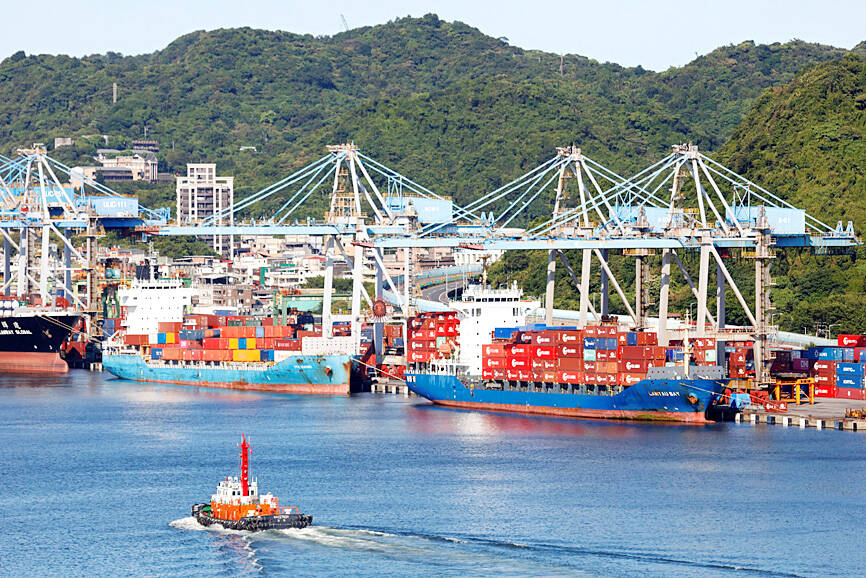Taiwan is to inspect 202 foreign ships entering the country’s seven large commercial ports between this month and November in accordance with the Memorandum of Understanding on Port State Control in the Asia-Pacific Region, also known as the Tokyo MOU, the Maritime and Port Bureau said yesterday.
For the Tokyo MOU, a port state control organization was established, which is composed of representatives from 21 member authorities, the bureau said.
The organization’s main purpose is to establish an effective and consistent port state control regime in the Asia-Pacific region, the bureau said.

Photo: Jameson Wu, Reuters
A concentrated inspection campaign (CIC) is also launched annually among member authorities to eliminate substandard shipping, protect the maritime environment and safeguard working and living conditions for seafarers, it said.
Taiwan is not a member of the International Maritime Organization, but nevertheless abides by the maritime safety regulations stipulated by international organizations, the bureau said.
The focus of this year’s campaign is to see whether seafarers carry qualification certificates, whether the number of crew members meets the minimum safety quota for onboard seafarers, and whether crew members can present health examination certificates and rest hour records, the bureau said.
The three-month maritime safety campaign would start today at seven international commercial ports across the country, it said.
“Our goal is to conduct random onboard inspections on 202 foreign ships in the next three months,” the bureau said, adding that the goal was set based on the number of ships arriving in Taiwan last year.
“We want to remind shipping firms and shipowners that they need to confirm the qualifications of the seafarers they have recruited and ensure that work shift schedules are friendly to seafarers,” it said.
During the CIC period, ships found with unqualified seafarers on board would be retained by commercial port authorities until improvements are completed in accordance with Article 60 of the Commercial Port Act (商港法), the bureau said.
Because of the annual inspections, Taiwan has been on the Tokyo MOU’s white list for five years in a row, which has greatly enhanced the efficiency of shipping fleets by lowering the frequency of inspections when they arrive in other countries, the bureau said.
“We have worked with CR Classification Society to offer seminars to shipping firms on how they should prepare for the CIC this year,” it added.

Stephen Garrett, a 27-year-old graduate student, always thought he would study in China, but first the country’s restrictive COVID-19 policies made it nearly impossible and now he has other concerns. The cost is one deterrent, but Garrett is more worried about restrictions on academic freedom and the personal risk of being stranded in China. He is not alone. Only about 700 American students are studying at Chinese universities, down from a peak of nearly 25,000 a decade ago, while there are nearly 300,000 Chinese students at US schools. Some young Americans are discouraged from investing their time in China by what they see

MAJOR DROP: CEO Tim Cook, who is visiting Hanoi, pledged the firm was committed to Vietnam after its smartphone shipments declined 9.6% annually in the first quarter Apple Inc yesterday said it would increase spending on suppliers in Vietnam, a key production hub, as CEO Tim Cook arrived in the country for a two-day visit. The iPhone maker announced the news in a statement on its Web site, but gave no details of how much it would spend or where the money would go. Cook is expected to meet programmers, content creators and students during his visit, online newspaper VnExpress reported. The visit comes as US President Joe Biden’s administration seeks to ramp up Vietnam’s role in the global tech supply chain to reduce the US’ dependence on China. Images on

New apartments in Taiwan’s major cities are getting smaller, while old apartments are increasingly occupied by older people, many of whom live alone, government data showed. The phenomenon has to do with sharpening unaffordable property prices and an aging population, property brokers said. Apartments with one bedroom that are two years old or older have gained a noticeable presence in the nation’s six special municipalities as well as Hsinchu county and city in the past five years, Evertrust Rehouse Co (永慶房產集團) found, citing data from the government’s real-price transaction platform. In Taipei, apartments with one bedroom accounted for 19 percent of deals last

US CONSCULTANT: The US Department of Commerce’s Ursula Burns is a rarely seen US government consultant to be put forward to sit on the board, nominated as an independent director Taiwan Semiconductor Manufacturing Co (TSMC, 台積電), the world’s largest contract chipmaker, yesterday nominated 10 candidates for its new board of directors, including Ursula Burns from the US Department of Commerce. It is rare that TSMC has nominated a US government consultant to sit on its board. Burns was nominated as one of seven independent directors. She is vice chair of the department’s Advisory Council on Supply Chain Competitiveness. Burns is to stand for election at TSMC’s annual shareholders’ meeting on June 4 along with the rest of the candidates. TSMC chairman Mark Liu (劉德音) was not on the list after in December last